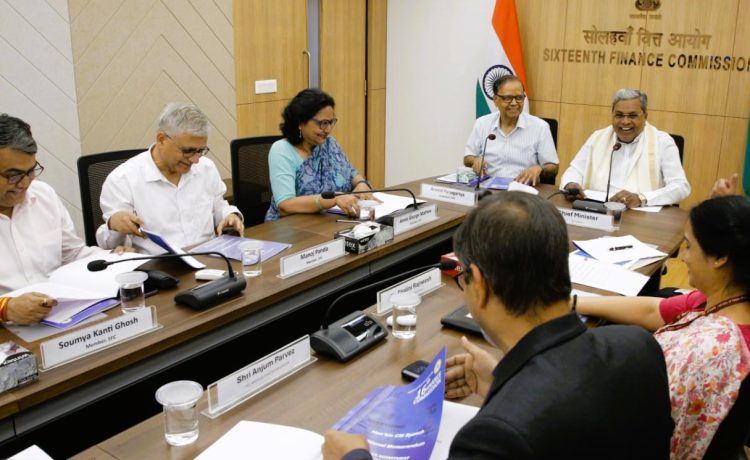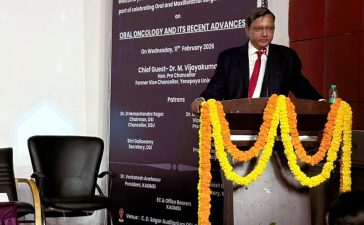Karnataka Pushes for Fair Share in National Resources: CM Siddaramaiah Presents Strong Case to 16th Finance Commission
Bengaluru | June 14, 2025: Karnataka Chief Minister Siddaramaiah on Thursday presented a forceful and data-backed case before the 16th Finance Commission, demanding a more equitable fiscal arrangement for states that significantly contribute to India’s economy. The Chief Minister met the Commission’s Chairman, Dr. Arvind Panagariya, and its Members in New Delhi to present both the main and additional memoranda outlining the state’s concerns, demands, and reform proposals regarding tax devolution and fiscal federalism.
Karnataka’s Economic Contribution Undervalued, Says CM
Addressing the Commission, CM Siddaramaiah emphasized Karnataka’s outsized contribution to India’s economic engine — accounting for 8.7% of the national GDP with only 5% of the country’s population. The state is also ranked second in GST collections nationwide.
Despite this, he flagged a striking imbalance in fiscal returns:
“For every rupee Karnataka contributes to Union taxes, we receive only 15 paise in return,” the Chief Minister said.
He noted that the 15th Finance Commission had slashed Karnataka’s share from 4.713% to 3.647%, causing the state a cumulative loss exceeding ₹80,000 crore.
Major Demands: A Bigger and Fairer Share for States
In its main memorandum, Karnataka proposed the following key fiscal reforms:
-
Vertical Devolution: Raise the states’ share in divisible taxes to at least 50%, and cap cesses and surcharges at 5%.
-
Horizontal Devolution: States should retain 60% of what they contribute, while 40% should go to less-developed states — a model balancing growth and equity.
-
Income-Distance Criterion: Reduce its weightage and give more emphasis to a state’s actual economic contribution, especially its share in national GDP.
“High-performing states like Karnataka must not be penalized for their success,” the Chief Minister argued.
Additional Memorandum: Calling for Predictability, Equity, and Growth
The supplementary memorandum underscored three major structural concerns:
-
Widening per-capita devolution disparities
-
Flawed Revenue Deficit Grant (RDG) model
-
Uncertainty around State-Specific Grants
Per capita, Karnataka’s devolution has dropped from 95% to 73% of the national average between the 14th and 15th Finance Commissions — despite the state’s rising GDP contribution.
“Equity must be time-bound and results-oriented. It cannot come at the cost of penalizing states that demonstrate good fiscal discipline,” Siddaramaiah noted.
Rethinking Revenue Deficit Grants
Karnataka raised serious questions about the effectiveness and fairness of Revenue Deficit Grants. The CM highlighted persistent deficits in many beneficiary states and suggested that RDGs be replaced with a horizontal devolution mechanism, applied uniformly.
The state also criticized the subjective basis used to evaluate expenditure priorities, which often downgrades welfare schemes.
“Welfare expenditures — which drive local demand and inclusive growth — should be treated on par with, or prioritized over, committed expenses like salaries and pensions,” Siddaramaiah said.
He invoked Mahatma Gandhi’s Sarvodaya philosophy, arguing for inclusive and equitable growth.
Formula-Based Grants Over Discretionary Funds
Karnataka urged the Commission to replace discretionary State-Specific Grants with a formula-driven allocation of 0.3% of Gross Union Receipts. However, the CM reiterated his request for special assistance for Bengaluru’s infrastructure and other key projects if the current grant mechanism continues.
₹1.15 Lakh Crore Investment Sought for Bengaluru
Reaffirming Bengaluru’s role as Karnataka’s economic powerhouse, the Chief Minister sought ₹1.15 lakh crore in investments to upgrade the city’s stressed infrastructure. He also pushed for targeted investments in underdeveloped regions like Kalyana Karnataka and Malnad, which suffer from chronic underinvestment and low incomes.
Concluding Call for Balanced Federalism
The Chief Minister concluded his presentation with a strong appeal for reforming India’s fiscal structure to promote both growth and fairness.
“Karnataka’s fiscal strength fuels national growth. It is time to ensure that growth is not penalized but rewarded. We urge the Commission to adopt a balanced, forward-looking approach to devolution,” Siddaramaiah told the Commission.
Context and Outlook
As the 16th Finance Commission reviews the distribution formula for the 2026–31 period, Karnataka’s pitch reflects broader concerns among high-performing states seeking recognition for their economic contributions. The state’s demands — if accepted — could set a precedent for redefining India’s fiscal federalism by rewarding efficiency and performance while ensuring support for backward regions.
🗣️ KEY QUOTES
🗨️ “Karnataka’s fiscal strength fuels national growth. It’s time to ensure growth is not penalized, but rewarded.”
— CM Siddaramaiah
🗨️ “For every rupee we contribute to Union taxes, Karnataka gets just 15 paise in return.”
— CM Siddaramaiah
🗨️ “Welfare-driven policies must be treated on par with salaries and pensions — they are not optional, they are essential.”
— CM Siddaramaiah
🗨️ “We are not asking for special treatment — we are asking for fair treatment based on facts, contribution, and fiscal responsibility.”
— Basavaraj Rayareddy, Economic Advisor to CM
🗨️ “The current Revenue Deficit Grant model rewards inefficiency while ignoring performing states. This must change.”
— Senior Karnataka Finance Department Official
❓Q&A
Q: Why is Karnataka demanding a higher share in tax devolution?
A: Karnataka contributes 8.7% to India’s GDP and ranks second in GST collections, yet receives only 15 paise for every rupee it contributes to Union taxes. The state argues this imbalance penalizes growth.
Q: What does Karnataka want from the 16th Finance Commission?
A: The state seeks an increase in vertical devolution to 50%, capping cesses and surcharges at 5%, and a formula that rewards economic contribution rather than just income-distance.
Q: Why is Bengaluru mentioned specifically?
A: Bengaluru drives Karnataka’s economy but faces infrastructure strain. The state has sought ₹1.15 lakh crore to upgrade the city’s infrastructure.
Q: What is the issue with Revenue Deficit Grants (RDGs)?
A: Karnataka believes RDGs are based on flawed, subjective assumptions and often disregard welfare schemes while favoring administrative expenses.
Q: What alternative has Karnataka proposed?
A: A formula-based grant system and redistributing RDGs through the same devolution formula applied uniformly to all states.
#FairShareForKarnataka #FiscalJustice #16thFinanceCommission #Federalism #KarnatakaEconomy #TaxDevolution #RewardGrowth #InclusiveGrowth #SarvodayaInFiscalPolicy #BengaluruInfraDemand
![]()











